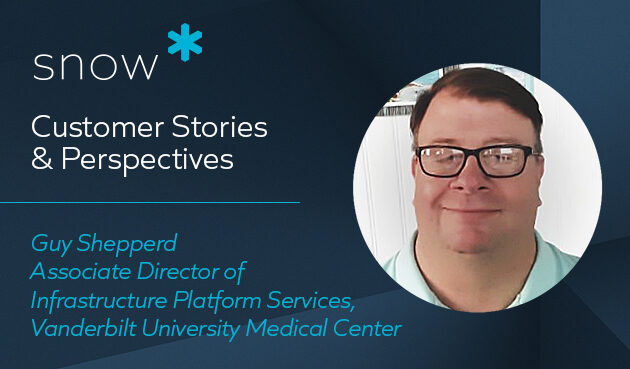The Importance of Unplugging in the Era of Remote Work

Since the start of the pandemic, employees have worked longer hours, blurring the line between the start and end of the workday. The move to remote and hybrid work has pushed boundaries between work and home life. “To avoid burnout, it’s crucial to look at one’s priorities and find ways to unplug,” says ITAM/SAM industry veteran and Snow customer, Guy Shepperd.
We recently sat down with Shepperd, Associate Director of Infrastructure Platform Services at Vanderbilt University Medical Center, to hear about his career, how the pandemic has impacted his team and tips for maintaining a work/life balance while working remotely.
Can you tell me about your career journey and your current role at Vanderbilt University Medical Center?
SHEPPERD: I came to the Medical Center as the Windows and Virtualization Director, which now is called the Infrastructure Platform Services Director. My team and I take care of the complete virtualized infrastructure, virtualization hosts, virtualized guests and all 3,500 Windows servers.
I spent 10 years in the Marine Corps. When I left, I decided to go to college and focus on Information Technologies. I had already gotten my start in IT while in the Corps. After college, I worked for a Fortune 100 company for about nine years. I decided to get off the road because time with my wife and kids was more important than traveling for work. I worked for a couple of small companies before moving to Vanderbilt University as their Unified Communications Manager. I managed email, SharePoint and instant messaging for all 66,000 people. And then, in 2016, we split into two organizations, namely Vanderbilt Medical Center and Vanderbilt University.
What my team has accomplished in the last five years for the hospital has been amazing. Before, we were a hospital in downtown Nashville with a few clinics and affiliate networks in three states. Now we have four hospitals with over 30 clinics and affiliates in three states. We are growing exponentially.
How has the pandemic impacted your team?
SHEPPERD: Actually, our productivity has increased during the pandemic. The hospital has two virologists who helped develop the vaccines, subsequently putting Vanderbilt at the forefront of the research. Our researchers have had enough input into the vaccine’s development that there are entities using cyber-attacks in an attempt to access our research. In return, our team has become hyper-alert about our security.
As an organization, we still have about 20% of our employees working remotely, but the far majority of IT is remote and we’ll stay that way moving forward. There’s no chance we’re going back into a physical location, but that has its pros and cons. Since our home is now our office, employees can’t get away from their work. They can work anytime they want. The con, however, is that they can be called into work at any time. Employees may feel the requirement to be constantly on camera or constantly in front of the computer, and this drains people very quickly and burns them out.
About six weeks into the pandemic, I was sitting in front of the computer and realized my team never logged off. They thought they had to be plugged in at all times. In the next team meeting, I told them to set realistic boundaries. My expectation is productivity, not time. Productivity is more important.
Your office and your house may be in the same place, but there’s an invisible line that needs to be acknowledged. Boundaries must be created. Your house may be an office when it’s time to work, but it needs to be your home when you are off the clock.
What are some ways that you and your team handle stress?
SHEPPERD: Early in the pandemic we didn’t do well, but we’ve now found outlets that help. The first thing we did was create a virtual office workroom. It’s basically a meeting that’s constantly running, where team members can jump in and jump out. They can talk about work, non-work subjects, or whatever is on their minds. It’s important for my team to still personally connect and have a sense of comradery. Because of that, we also decided to host more team-building events.
On a more personal level, I didn’t want my team to lose focus of their personal relationships with family and friends. Their families are ultimately their support systems. My boss and I both believe that our family comes first. It’s easy to execute that philosophy when your supervisor holds the same belief. If there’s ever a choice between work and family, the answer is family. Don’t ever think a day of work is more important than the needs of your family. That was my belief before the pandemic, and it’s the same now. Especially now. If everything is alright with your family and you’re good there, then you can be more focused and productive at work.
Lastly, but certainly not least, is the need to reassess your priorities. Employees should take time to unplug, re-center and re-focus. Whether that means spending time with family or just getting away from the computer screen, downtime is incredibly important. It allows an employee to come back refreshed, with a renewed perspective.
How have you found ways to unplug?
SHEPPERD: Just a few weeks ago, my wife and I took a two-week road trip following old Route 66 that runs from Chicago to Barstow, California. The pandemic had made us a bit stir crazy and we needed to get out of the house, away from work and away from technology. We drove over 4,000 miles along the historic highway, staying in restored pre-1950s court motels and eating in notable diners and cafés. We visited historical locations, national parks, and some very quirky sights along the way. Along with that, we met some incredible people with amazing life stories, which truly put perspective to ours.

Photo by: April Shepperd
As we eased into our vacation, we became more relaxed and our stress waned away. Each day, we were excited about waking up and experiencing a new place and a new adventure. Along with driving the “Mother Road”, we were also driving our stress away. That’s what the whole trip was about.
To learn more about our featured guest, Guy Shepperd, check out his bio on LinkedIn.
This post is part of a series of blogs that highlight IT practitioners and their on-the-job experiences, diverse backgrounds and what it means to work in IT today.
If you’d like to share your story with Snow readers or nominate an ITAM/SAM star to tell theirs, please send an email to kathleen.shepherd@snowsoftware.com.